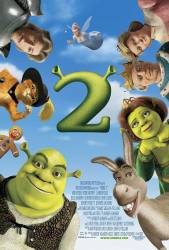
Question: Since Shrek and Fiona were both turned in to humans by the Happily Ever After Potion and Donkey is turned in to Stallion, does anyone have an idea as to what Dragon would have become since she is Donkey's True Love?
Answer: It was confirmed by the filmmakers that Dragon is actually Donkey's true love, and that when Donkey was a stallion she changed as well, supposedly into a talking pegasus.
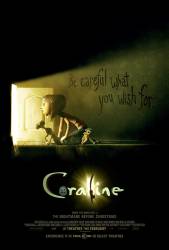
Question: After Other Wybie frees Coraline from the mirror and is helping her escape, he takes off his glove and blows away his hand. Is something happening to him?
Chosen answer: Coraline urges Other Wybie to escape with her. He shows her that he can't - he is not a person, just another puppet of the Other Mother. What is blowing away is the sawdust Other Mother fills her puppets with.
He's just a temporary distraction.
Answer: It's because the other Wybie isn't real, he is just one of the other mother's creations. The other world is full of magic, so if he tries to go to the normal world he will turn into sawdust or sand because the normal world has no magic.
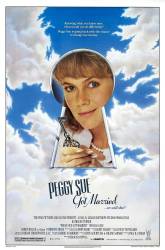
Question: I never understood the significance of the girl in the wheelchair at the reunion. Peggy Sue makes a big deal out of the girl but never in her "flashback" do we see this character.
Answer: You DO see Rosalie in the past. She hosts the party at which Charlie and his group sing. And Jim Carrey asks for the lights to be turned out. She walks, and begins to dance with her boyfriend.
No, that was Maddie's party. Peggy Sue's mom said so when she asked her why she wasn't ready for the party, when Charlie came to pick her up.
I finally see her, thanks! She's to the left of Peggy Sue and her girlfriends as they watch Charlie and the guys sing. Then she's the girl dancing on the counter at the coffee shop when Peggy Sue meets with Michael Fitzsimmons the first time. I always wondered about the Rosalie plot hole.
I think we DO see Rosalie before her accident-she is the girl dancing on the counter at the coffee shop when Peggy Sue goes for coffee and a donut and runs into Michael Fitzsimmons. Peggy Sue pauses and watches her for a moment.
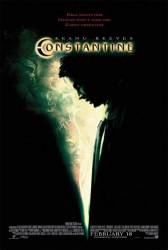
Question: Even though Isabel committed suicide, shouldn't she have gone to heaven? She willfully sacrificed herself to insure that Mammon couldn't cross on to earth so in a way, she was saving billions of people, so that should have guaranteed her entry into heaven.
Answer: Sin for a good reason is still sin, and as Gabriel says earlier, you can't buy your way into Heaven. Real Catholic dogma, however, doesn't hold the mentally ill as condemned for committing suicide.
Except Isabel wasn't mentally ill. She saw angels and demons just like Constantine did. It was her parents who believed she was mentally ill.
While suicide is a mortal sin, it's shown later (as in major plot point) that sacrificing yourself to save the world is a redeeming act.
Yes, but Constantine also said "My parents were normal. They did what most parents would do. They made it worse. You think you're crazy long enough, you find a way out" which could relate to Isabel losing her sanity in a way as well because of her family and how they saw her. The whole Isabel's sacrifice is added by the novelization but the movie is ambiguous about the suicide.
Except Isabel wasn't mentally ill. She saw half breeds just like John did.
Sacrificing yourself for others isn't a sin.
Answer: If a soldier jumps on a grenade and dies to save his fellow soldiers, it's considered giving one's life for others. To my understanding, that isn't considered a "sin." If it was a mental health issue, a just God would give her a pass. If she was doing it to thwart Mammon's plans, again she was sacrificing herself. If she did it to get Constantine involved to help stop Mammon, again is was self sacrifice. (Notice how she says "Constantine" just before jumping when her sister views the video?). As a plot device, I understand it, but from a theological standpoint it is weak.
Answer: It is shown in the movie that it was Balthazar who whispered into her ear, gave her suggestions. Eventually she committed suicide to escape that, to escape her torment. She certainly didn't sacrifice herself to keep Mammon out because Mammon needed twin psychics, one in hell and one on Earth to do it, which Balthazar achieved for him.
The film doesn't give information about the need of having one twin in hell and the other on earth to complete Mammon's plan; the movie states Mammon needs a powerful psychic and God's help. It isn't shown either that Balthazar was the one whispering to Isabel's ear considering she was apparently hearing Hellspeak, but no individual besides her appeared on the death scene; therefore, it was left ambiguous. Otherwise, provide evidence of the statement above.
When John and Angela are walking back to the elevator after taking care of Balthasar they specifically mention Mammon needed twin psychics. The only reason would be for their connection. One is in hell, the other on Earth. Through their connection Mammon is able to posses Angela. As for the second thing. When Isabel commits suicide you both hear Balthasar whisper to her and she has the mark on her wrist, like Hennessy had on his hand palm, the sign of Mammon. They wanted her in Hell.
The dialogue, when they are walking towards the elevator, is "Constantine: Beeman said Mammon needed divine assistance to cross over. How's the blood of God's only son? Ángela: The stains on the spear. Constantine: Yeah. Ángela: So he gets the spear. He still has to locate a powerful psychic. Constantine: Not really. Ángela: Twins." Angela says "twins" after hearing Constantine say "Not really." (while looking at her) which made Angela realise that she was Isabel's replacement as a powerful psychic since they had the same gift, but the former's was dormant up until that moment. It's not because the plan needed one in hell and the other on earth. That's never stated as far as we know from the information provided by the film. As for Balthazar, it's never stated it was him who whispered to Isabel. That's an assumption based on hearing the voice alone. Also, the mark appeared on the guy's hand at beginning of the film after he found the spear and Balthazar was probably not there.
It's not an assumption when it's his voice. It doesn't all have to be "stated." And the whole twin part is just a coincidence? Are you saying Gabriel and Balthasar found twin psychics so they have a backup if one of them dies? That's ridiculous. They needed twin psychics specifically, and they make one of them commit suicide. That's not just a random thing, it's what needed to be done. And it's Mammon's sign, not Balthasar's.
It's an assumption because there is insufficient evidence to prove it, and there were other voices in the film to assume it was specifically Balthazar's given that Angela heard a similar voice calling her name when she was in hell and Mammon appeared, which could indicate that maybe it was Mammon who whispered to Isabel too but still not clear though. It's more speculation. Yes, not everything has to be stated since some things are implicitly given although it also depends because it can become ambiguous if it lack details which is open to interpretation, but the movie dismisses any possibility of your theory of "one in hell and the other on earth" by stating what the "villain" needed and with that the argument doesn't work. Otherwise, it would be a plot hole for creating an inconsistency with the rules established before. Angela just realised she was the powerful psychic since they had the same gift, so Mammon didn't have to locate another one since it was there in the other twin.
There is no inconsistency with the rules, there is help from god, there is a psychic. All that fits, the Hell Bible just wasn't specific enough, they didn't know the full plan. There is something significant about them being twins. Both because Isabel was killed and Angela and Constantine realise that's what Mammon was looking for.
Now, all that is just speculation, and misinterpretation of what has been explained in the reply above yours. Not continuing the discussion.
Answer: The film itself can't be blamed for that really because it was left ambiguous; the novelization added the part of Isabel's sacrifice to the story. If we go by what the film gave us then Isabel might have been an unstable person considering even Angela didn't back her up about what they could see which could've led her to believe that maybe she was indeed crazy, and as Constantine said "You think you're crazy long enough, you find a way out." Perhaps she just wanted to end everything that was happening to her. There isn't enough information in the movie to confirm or deny it.
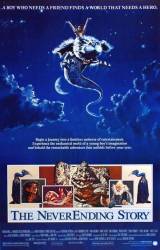
Question: What is the meaning of the rock paintings that Atreyu finds, that seem to sum up all his adventures? (This is right before the fight with that black wolf-creature.)
Answer: The meaning is basically all his adventures have been fortold and recorded, kind of like as if they were part of a book.
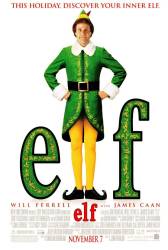
Question: When The Central Park Rangers are called in action it mentions the Simon and Garfunkel concert and their actions being under speculation - was this a real event (their questionable actions), and if so what was the problem, or was it just a fictional jokey reference?
Answer: This was a real event. The Simon and Garfunkel free concert drew a crowd of over half a million people and the Central Park Rangers were investigated for being a little "over-enthusiastic" in their methods of crowd control. It was 1981 though, not 1985 as stated.
Absolutely correct and thank you - I was there at the concert and it was 1981. I love the movie Elf but that incorrect reference is a slight irritant - LOL.
Answer: I believe that this refers to an incident I was involved in. I was a new ranger riding Captain Cutter, an ex-race horse that we had Nick named Captain Goofy due to his propensity to suddenly spin in circles without warning. We were leading buses of handicapped people through shoulder-to-shoulder crowds when Goofy did his thing sending people scattering in all directions. It was over pretty quickly. I did not realise at the time that it was news.
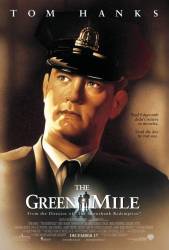
Question: When the guards are talking to Percy in the restraint room, Paul says he knows he sabotaged Del's execution. Why did he let him get away with it?
Chosen answer: Percy's aunt is married to the state Governor, giving Percy powerful connections. All it would take is one phone call from Percy and Paul and the other guards could lose their jobs and if Percy wanted to, never find jobs again. Something Paul or his friends didn't want to happen.
The characters talk about this several different times in the movies, how political connections can ruin careers.
Answer: In addition to previous answers, it is probably also worth mentioning that they will never be able to prove it. Percy mentions multiple times that he "didn't know the sponge should be wet," even when they are back in the Green Mile and only Paul and the other guards are around, indicating that that will be his defence when they ever make it into a thing, knowing that they will never be able to prove otherwise.
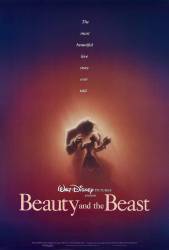
Question: Does Chip really have as many siblings as there are cups in the kitchen? Seems a bit too many, and also they aren't seen as real children at the end of the movie.
Answer: The servants in the castle are transformed into enchanted objects because of the spell, but there are still plenty of other objects in the castle which were not originally people.
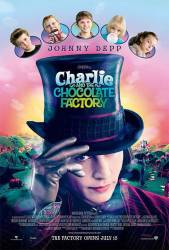
Question: After young Willy sees his childhood home disappear, where did he live and grow up?
Answer: We are never shown what happened to him but he may have gone to live with relatives or he was simply put into an orphanage.
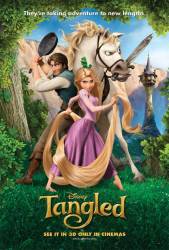
Question: Is it possible the king and queen could recognize Rapunzel as their long lost daughter, despite her short brown hair, when they knew she was born with long golden hair? If so, then how?
Answer: It's entirely possible. Rapunzel has a similar face appearance to her mother's, and you could also count the family bond of simply knowing. She also has green eyes, which are uncommon, so the parents probably knew that she was unlikely an impostor.
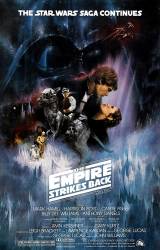
Question: Is there any reason why Luke believes what Darth Vader says when he tells him that he is his father?
Answer: The vision Luke sees in the cave on Dagobah is a clue to this. Luke is realizing he has a lot more in common with Darth Vader than the idealized father he'd always imagined. When Vader tells him he's his father, Luke doesn't want to believe it, but he simply can't deny that it feels much more true that his father would be someone passionate and reckless like himself rather than someone who exemplifies a noble Jedi, which feels like an obvious myth in hindsight.
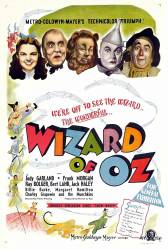
Question: It is implied strongly in this movie that water makes witches melt, and this is spoofed in other media. I've only ever seen this referenced to wicked witches. Does water make good witches, such as Glinda, melt too?
Answer: In all likelihood, probably not. Water is often depicted and represents purity, and cleansing. It flows smoothly, is beautiful, clear, and responsible for life on Earth. Everything the Wicked Witch is not. Where as the good Witch is pure and of a true heart. So it makes sense that something so evil and impure as the evil witch would be effected by the purest substance there is, yet not harm the good witch because she is good.
Answer: In the original book, water caused the wicked witches to melt away because they were so old and shriveled that all the fluid in their bodies had long since dried away. Meanwhile, the film Oz: The Great and Powerful instead implies that the Wicked Witch of the West is weak against water due to being a fire-elemental witch, which could also be the case for this incarnation, meaning it wouldn't apply to other witches like Glinda (whose element in both films appears to be ice) or even the Wicked Witch of the East (whose powers are never shown in this film, but were electricity-based in Oz the Great and Powerful).
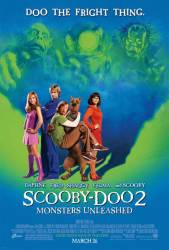
Question: Was there ever a real Heather Jasper Howe?
Answer: Yes! There was a real Heather Jasper Howe! Like the fake Heather Jasper Howe's True Identity is Jonathan Jacobo! He was arrested with Ned.
Answer: Yes.
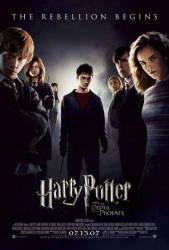
Question: When Umbridge has Harry, his friends and the Slytherin students in her office, she asks Harry if he was going to warn Dumbledore. When he says he wasn't, she responds by slapping him in the face. In the background, Draco has a look of shock on his face. Considering the fact that he hates Harry, why would he react this way?
Answer: It was probably a mistake. Tom Felton may have flinched by accident.
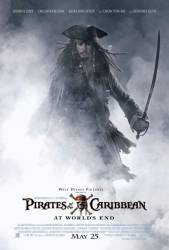
Question: Maybe I'm missing something, but why can't Elizabeth just live on Will's boat at the end? Someone suggested it was because she cannot go into Davy Jones' Locker, but she has been there and got out before so why not again? Also, Will's father isn't dead but he can travel with Will, so why couldn't Elizabeth just join his crew?
Answer: From the point of view of the Dutchman, Bootstrap is dead enough to serve on the ship. The idea is that Jones rescues people who would otherwise simply have drowned and makes them serve on his ship in lieu of death; as such, they can be considered technically deceased. Elizabeth has been into the Locker, yes, but with the demise of Jones, the Locker may not even exist any more. Will's task is to escort the dead into the afterlife, not the Locker - while Elizabeth survived the Locker, the afterlife may be something entirely different. The rules regarding the Dutchman and the duties of her crew are never spelled out, but it seems that, no, Elizabeth cannot live on her.
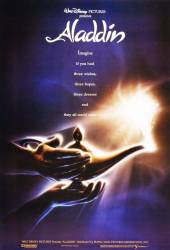
Question: What does Aladdin mean when he says: "Look at that Abu, it's not everyday you see a horse with two rear ends."?
Answer: Aladdin is referring to the person riding the horse as being a "horse's ass" in the way he is acting, thus the horse the person was riding on has two rear ends, his own and the rider.
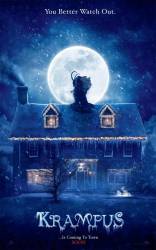
Question: How does the movie really end? Are the family trapped in a snow globe for all eternity, or were they given a second chance and Krampus is just watching them?
Answer: The ending is that they are all alive and Krampus gave them a second chance. Evidence of this comes from the director's commentary and the comic book prequel "Krampus: Shadow of Saint Nicholas".
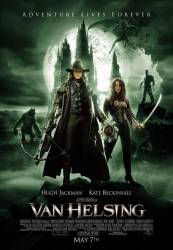
Question: In the beginning of the film, where Dracula is talking to Viktor vonFrankenstein, he slams the chest shut and begins yelling at him. Before this, Viktor was looking over his shoulder and his attention immediately snaps back to Dracula, but he then turns once more to look behind him before staring at Dracula again, can someone explain why he looks over his shoulder a second time?
Answer: During their conversation Dracula is able to move around the room without Viktor noticing it. Then Dracula is standing on top of the fireplace behind Viktor, that's why he turns his head the first time. When Dracula suddenly slams the chest Viktor is surprised to see Dracula suddenly standing in front of him so he instinctively turn his head to look at the fireplace to believe his own eyes.

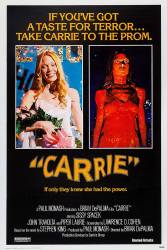
Answer: Baby face taps RR TOYS COME OUT. Telling the other toys to come out from hiding. Pixar stated this in their Toy Story character overview.
But why "RR"?
"RR" is shorthand for "Message Received." Babyface is telling Woody that he understands Woody's problem and then taps out to the other toys to come out.